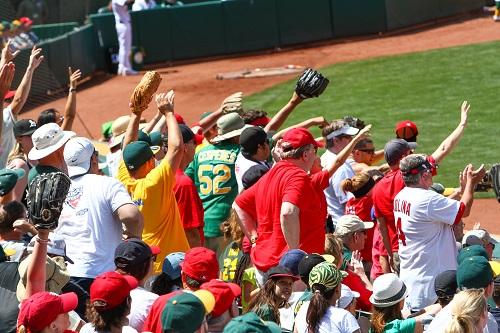

But the concept has emerged as one way stadiums and arenas in other states are navigating the new challenges of gradually welcoming back more fans.
Major League Baseball’s Los Angeles Dodgers, for example recently doubled the size of the “fully vaccinated fan section” at Dodger Stadium, bringing the total capacity in vaccinated sections at more than 1,000, according to the Los Angeles Times. Ticket prices range from $34 to $75 per seat, depending on the section and day of the week, and adult fans must show proof that they received their final vaccine dose at least two weeks prior to the game. Children from ages 2 to 15 must show proof of a recent negative COVID-19 test. Masks are still required in all vaccinated sections.
“Dodgers President Stan Kasten has said he hopes Dodger Stadium can open at full capacity by June 15, when Gov. Gavin Newsom has said the state will reopen without restrictions,” the Times reports.
In Pennsylvania, the NHL’s Pittsburgh Penguins have petitioned the state to allow for vaccinated-only sections at PPG Paints Arena. “We are encouraged by the number of people in and around the region that have been vaccinated and feel that this would be a safe and effective way to allow more fans access to attend games,” Penguins CEO/President David Morehouse wrote in an email to season-ticket holders late last month, according to TribLive.com.
“I’ve had conversations with the Pittsburgh Pirates about the same idea,” Pittsburgh Mayor Bill Peduto told the website. “If we can create areas where everyone has to show that they have been vaccinated, they believe more people would want to attend the games. They believe that knowing that everyone around them is vaccinated and wearing a mask would actually draw people.”
The NFL’s Buffalo Bills and the NHL’s Buffalo Sabres, meanwhile, “are believed to be among the first teams in the country — if not the very first — to have their local government announce a full vaccination policy will be in effect to attend games,” according to WIVB.com, Buffalo’s CBS television affiliate.
In April, Erie County Executive Mark Poloncarz announced that fans will need proof of vaccination in order to enter the Bills’ Highmark Stadium and the Sabres’ KeyBank Center, both of which the county owns. “Our goal is to ensure a 100 percent safe environment,” he said at a news conference announcing the plan.
As individual communities and teams make plans for a return to some sense of normalcy when it comes to fans in the stands, a major key to that success likely will be contactless ticketing and payments. SKIDATA, a digital access platform, earlier this year partnered with the proprietary HIPAA-compliant MyOwnMed medical app to “create the opportunity for individuals who have received the COVID-19 vaccine, anti-body or PCR testing to safely access sporting events, college campuses, and office buildings using their personal mobile devices,” according to a statement from SKIDATA.
“What we did by utilizing the relationship with MyOwnMed is to have a protected, encrypted data platform in the cloud controlled, not by us and not by the club, but by the fans themselves,” Andrew Feffer, head of business development for SKIDATA, told Athletic Business. “Once that information is loaded by the fan directly into the platform — not through us, but directly, seamlessly through the team app — and goes up to MyOwnMed’s encrypted protected portal, we then get information at the gates when they put their phone up to a reader, and we instantaneously know whether they are a green for entry or a no based on the medical and ticketing credentials.”
As the sports business industry publication noted, “thegoal is for sports organizations and facility operators to have some idea of what precautions — PCR tests, antibody tests or vaccinations — a visitor has taken prior to entering the venue. It could be the key to keeping people safe while in close proximity at an event.”
Other platforms similar to SKIDATA also are in use. Here’s a rundown.
Unfortunately, having a multitude of apps could lead to confusion; one take can be found here.
Regardless of the strategies teams employ, privacy concerns will be a major factor going forward and could be the difference between fans choosing to attend games, opting to watch on TV or not tuning in at all.
That’s why the NBA in April announced a partnership with CLEAR, a secure identity company, that will make CLEAR’s Health Pass technology available to all NBA teams for COVID-19 screenings in their arenas. Already, at least one-third of all teams have begun using it for fans and employees, although ESPN.com reports that “there are no plans for players to use the CLEAR service.”
According to a league statement, Health Pass is a free mobile app “that securely connects a user’s verified identity to multiple layers of COVID-19-related health information — like test results — to help reduce public health risk and aid in the safe return of fans to NBA venues.”
The app allows fans to securely access and verify their health information prior to entering an arena, as well as link their vaccination records to their Health Pass account.
As CLEAR CEO Caryn Seidman-Becker noted in the NBA’s announcement of the partnership, “trust and transparency are CLEAR’s number one priority, and … our goal is to get people back to what they love while ensuring they are always in control of their health information.”

